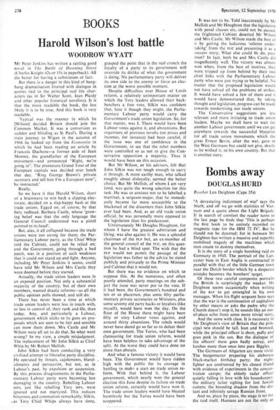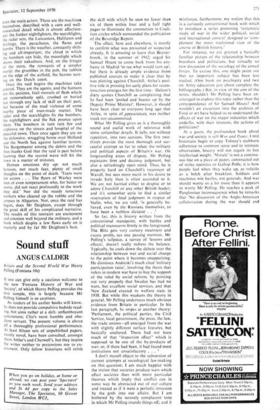Bombs away
DOUGLAS HURD
Bomber Len Deighton (Cape 35s)
'A devastating indictment of war' says the blurb, and off we go with statistics of Viet- nam and a quote about the Light Brigade. If in search of comfort the reader turns to the last page he finds that 'This is perhaps the first book to be entirely recorded on magnetic tape for the IBM 72 IV'. But he should not be deterred; for in between Mr Deighton has written a massive and superbly mobilised tragedy of the machines which men create to destroy themselves.
It is the story of a single bombing raid on Germany in 1943. The portrait of the Lan- caster base in East Anglia is constructed in parallel with that of the little German town near the Dutch border which by a desperate mistake becomes the bombers' target.
Of these two careful composite portraits the British is surprisingly the weaker. Mr Deighton seems occasionally when writing of the RAF to get entangled in his own messages. When his flight sergeant hero says that the war is the continuation of capitalism by other means or asks the padre why the Church doesn't stop it, he sounds like an out- of-place echo from some more trivial story..
And the same with class. It is necessary to Mr Deighton's view of Britain that the prin- cipal coN should be tall, lean and bronzed, while the principal officer is short, puffy and goes pink in the sun. But the dialogue of the officers' mess goes badly astray, and lurches more than once into pure Biggles.
The Germans of Altgarten are more vivid. The burgomaster preparing his elaborate black-market birthday party; the night- fighter ace confronted by his closest friend with evidence of experiments in the concen- tration camps; the elderly radar officer quietly falling in love with his housekeeper; the military tailor sighing for lost Jewish cutters; the brooding shadow from the dis- tant and infinitely savage Russian front. And so, piece by piece, the stage is set for the raid itself. Humans are not the only or
even the main actors. These are the machines themselves, described with a care and well- researched detail which is almost affection- ate: the Junker nightfighters, the searchlights, the radar sets, the Lancasters, Halifaxes and Stirlings, the parachutes, the flares and bombs. There is the weather, constantly shift- ing and all-important, the cloud in which the bombers can hide, the moonlight which shows their nakedness. And, on the fringes of the story, the remnants of a simpler world: the grumbles in the pub, the rabbits on the edge of the airfield, the herons nest- ing on the Dutch coast.
Once the raid begins the machines take control. They are the agents, and the humans are the patients, frail morsels of flesh which are remorselessly split, crushed or buried not through any lack of skill on their part, but because of the mad violence of some nearby piece of man-made matter. The radar and the searchlights fix the bombers, the nightfighters and the flak pounce upon them. The bombers in turn rain fire and explosive on the streets and hospital of the peaceful town. Then once again they are on the defensive, struggling home over Holland and the North Sea against familiar terrors. The Burgomaster among the debris and the fires thanks God that the raid is past before learning that the second wave will hit the town in a matter of minutes.
Human emotions dry up: not much heroism, not much fear, plenty of small thoughts on the point of death. 'Tears were for actors . . . The flyers of Warley were men of even temperament who, for better or worse, did not react profoundly to the work they did.' Nor did the steady tenacious workers who cleared up the rubble and the corpses in Altgarten. Nor, once the raid has begun, does Mr Deighton, except through the great skill of his complicated narrative. The results of this restraint are excitement and emotion well beyond the ordinary, and a book which despite a few flaws early on is masterly and by far Mr Deighton's best.















































 Previous page
Previous page